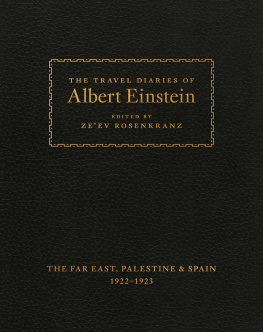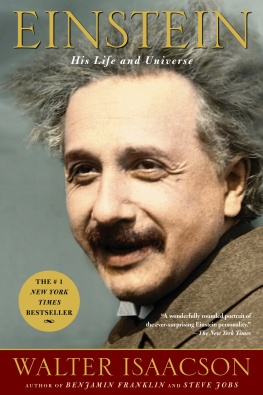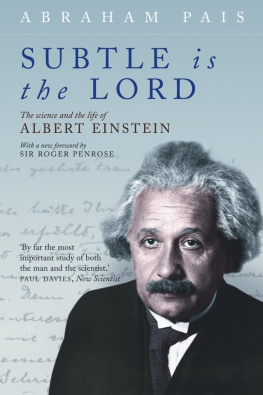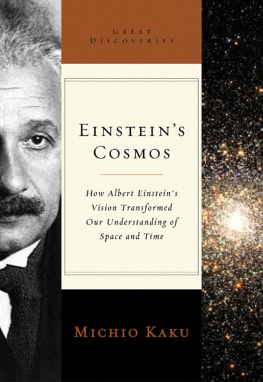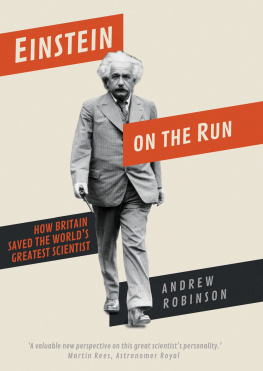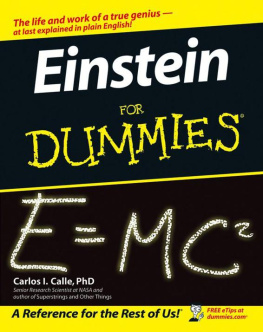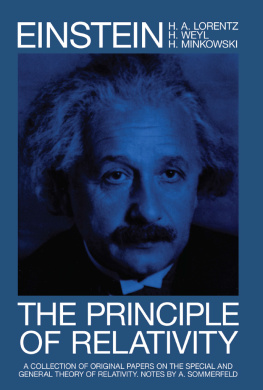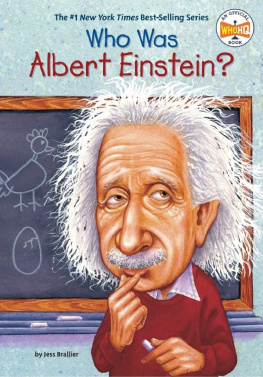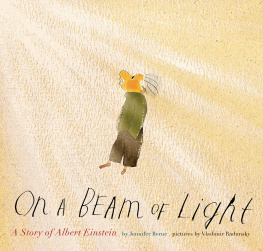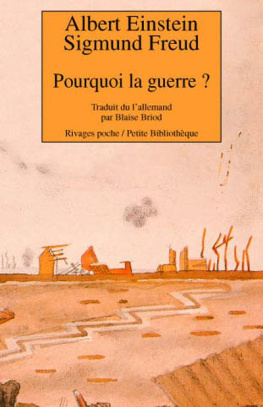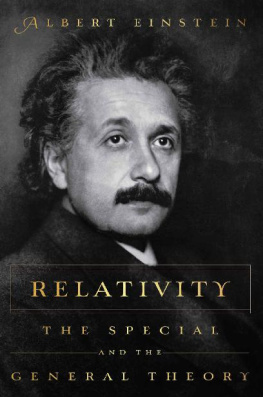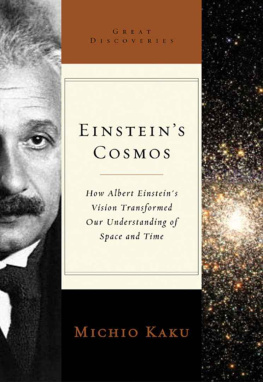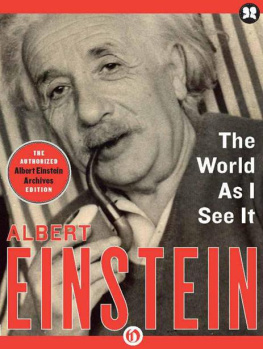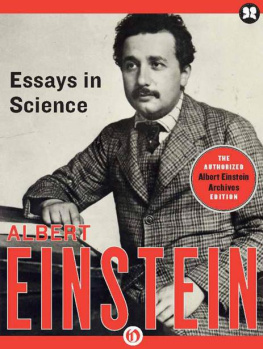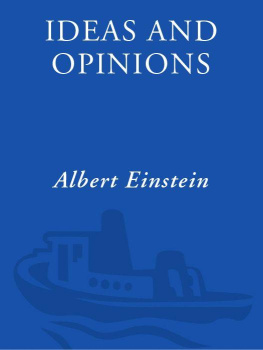Einstein Albert - The travel diaries of Albert Einstein: the Far East, Palestine & Spain, 1922-1923
Here you can read online Einstein Albert - The travel diaries of Albert Einstein: the Far East, Palestine & Spain, 1922-1923 full text of the book (entire story) in english for free. Download pdf and epub, get meaning, cover and reviews about this ebook. City: Asie;Espagne;Palestine, year: 2018, publisher: Princeton University Press., genre: Detective and thriller. Description of the work, (preface) as well as reviews are available. Best literature library LitArk.com created for fans of good reading and offers a wide selection of genres:
Romance novel
Science fiction
Adventure
Detective
Science
History
Home and family
Prose
Art
Politics
Computer
Non-fiction
Religion
Business
Children
Humor
Choose a favorite category and find really read worthwhile books. Enjoy immersion in the world of imagination, feel the emotions of the characters or learn something new for yourself, make an fascinating discovery.
- Book:The travel diaries of Albert Einstein: the Far East, Palestine & Spain, 1922-1923
- Author:
- Publisher:Princeton University Press.
- Genre:
- Year:2018
- City:Asie;Espagne;Palestine
- Rating:5 / 5
- Favourites:Add to favourites
- Your mark:
- 100
- 1
- 2
- 3
- 4
- 5
The travel diaries of Albert Einstein: the Far East, Palestine & Spain, 1922-1923: summary, description and annotation
We offer to read an annotation, description, summary or preface (depends on what the author of the book "The travel diaries of Albert Einstein: the Far East, Palestine & Spain, 1922-1923" wrote himself). If you haven't found the necessary information about the book — write in the comments, we will try to find it.
The travel diaries of Albert Einstein: the Far East, Palestine & Spain, 1922-1923 — read online for free the complete book (whole text) full work
Below is the text of the book, divided by pages. System saving the place of the last page read, allows you to conveniently read the book "The travel diaries of Albert Einstein: the Far East, Palestine & Spain, 1922-1923" online for free, without having to search again every time where you left off. Put a bookmark, and you can go to the page where you finished reading at any time.
Font size:
Interval:
Bookmark:

THE TRAVEL DIARIES OF ALBERT EINSTEIN
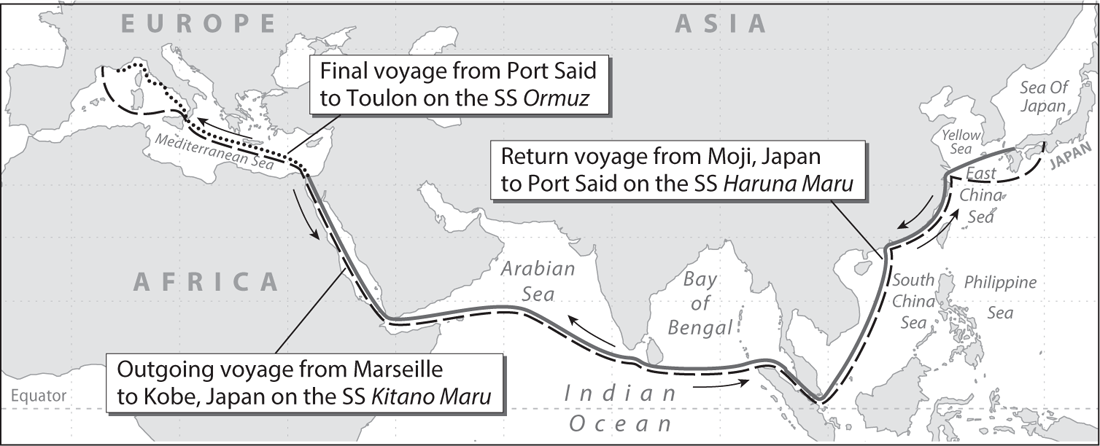
Map with itinerary of Einsteins ocean voyages
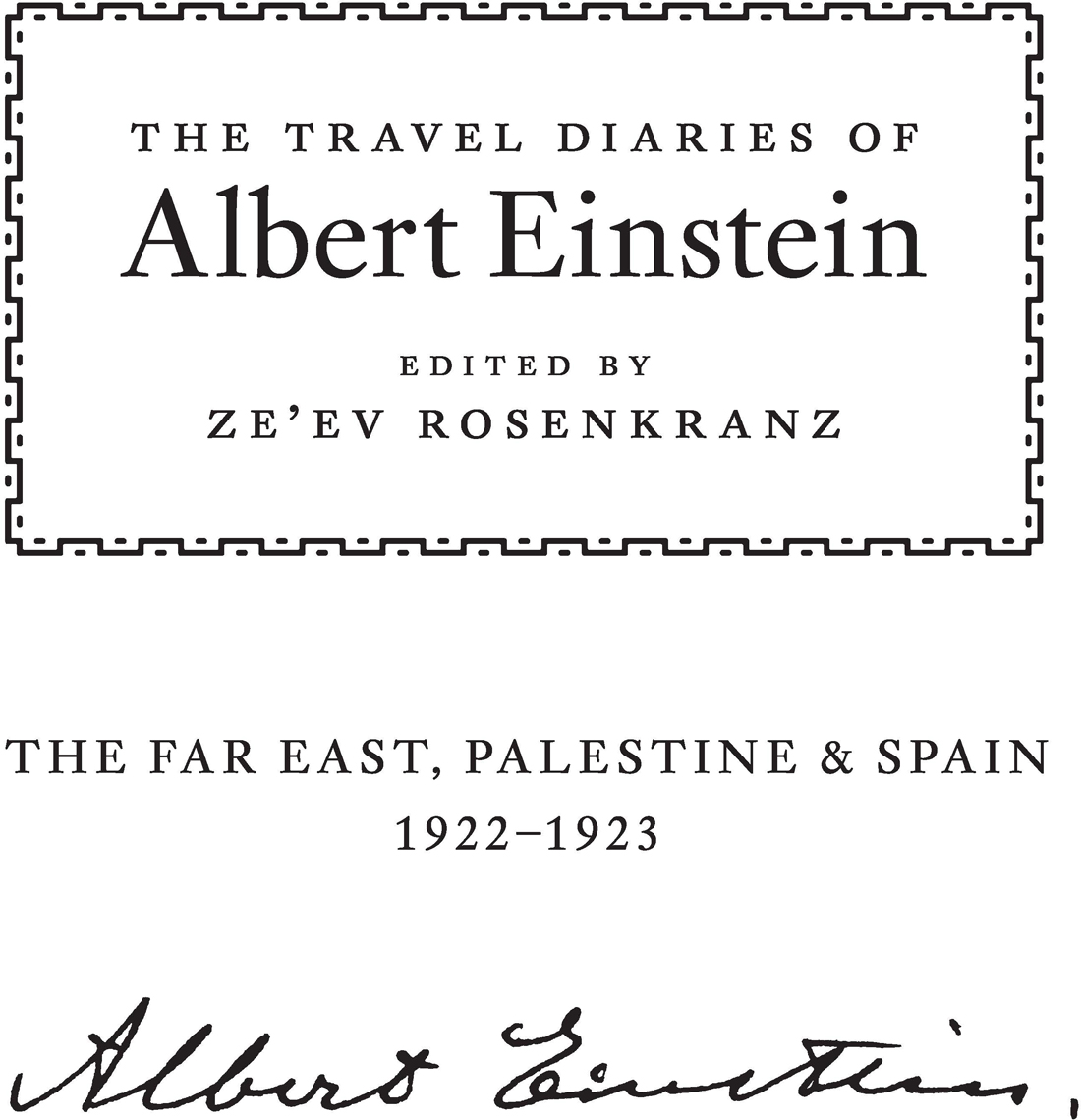
PRINCETON UNIVERSITY PRESS
PRINCETON AND OXFORD
Editorial apparatus and diary translation
copyright 2018 by Princeton University Press
Travel diary, additional texts, and endpaper images
copyright 2018 by the Hebrew University of Jerusalem
Requests for permission to reproduce material from this work
should be sent to Permissions, Princeton University Press
Published by Princeton University Press
41 William Street, Princeton, New Jersey 08540
In the United Kingdom: Princeton University Press
6 Oxford Street, Woodstock, Oxfordshire OX20 1TR
press.princeton.edu
Cover and book design by Chris Ferrante
All Rights Reserved
ISBN 978-0-691-17441-9
Library of Congress Control Number: 2018931638
British Library Cataloging-in-Publication Data is available
This book has been composed in Kis Antiqua Now
Printed on acid-free paper.
Printed in the United States of America
10 9 8 7 6 5 4 3 2 1
To my parents
Ruth Hannah Rosenkranz (19282015)
&
Arnold Rosenkranz (19231999)
with whom I embarked on
my very first voyages
Contents
TRAVEL DIARY |
Illustrations
Frontispiece. Map with itinerary of Einsteins ocean voyages
Preface
I GREW UP A FIVE-MINUTE WALK from the beach in the bayside suburb of St. Kilda in Melbourne, Australia. It was the Sixties and early Seventies, and St. Kilda was still a bit seedyit has since been partially gentrified. The Jewish refugees from Europe would stand on Acland St. and converse in languages I could not understand. My Anglo-Dutch Jewish maternal grandfatherwho had himself immigrated to Australia from London in the aftermath of the Great Warwould call these more recent immigrants the refs, a derogatory term for refugees.
My Viennese father loved to take me on a three-mile, hour-long weekly walk along Beaconsfield Parade to Station Pier in Port Melbourne to see the ocean liners that had docked there. He was always drawn to the sea. Born in landlocked Vienna, he had fled to Shanghai in late 1938 and lived there for ten years, including almost four years under Japanese occupation in the Jewish ghetto under harrowing conditions. After the end of World War II, he easily made friends with visiting American sailors. In 1948, as a committed Zionist, he left on the second ship to depart from Shanghai with Jewish refugees for the newly formed State of Israel. But the country could not hold my father (who was the personification of the Wandering Jew) for long. In 1950, he returned to Vienna, mainly due to homesickness. Six years later, he was traveling by sea againthis time to Australia to start a new life there, just in time to attend the Melbourne Olympics. A few years after that, he met my Melbourne-born mother. Yet his wanderlust continued and, when I was almost eleven, we returned to Station Pier, this time as passengers.
The four-week voyage on an Italian ship took the remigrating tailor and his family back to Europe via the Cape of Good Hope (the Suez Canal was still under blockade following the Six Day War). I found life on the ocean liner somewhat boring; I was too old for the childrens room and too young for the adults activities. But I made some good friends onboard, and that helped pass the time. My most vivid memories from that voyage were the frequent announcements in the ships Sea Herald to set the clocks back by half an hour, as we traversed the globe and changed time zones, and the many times I sneaked into the small cinema on board to watch the Japanese sci-fi movie, The Green Slime. I loved the film so much that I would attend both the English and the Italian viewings.
Two more ocean crossings would ensue within the next three years, as my father found it difficult to decide where he wanted to live. It wasnt the most stable lifestyle for his prepubescent son, but coming of age in both Australia and Austria was a good way to pick up languages and an internationalist outlook. Growing up Jewish in the Vienna of the 1970s certainly had its challenges. One of them was coping with occasional anti-Semitic remarks by our Klassenvorstand, our class director, at the local Gymnasium. One of his favorite bon mots was to refer to the Affentrkei (Turkey of the monkeys). At the time, I had no idea that this was an anti-Semitic comment, apart from being racist in other ways as well. The xenophobic joke in Vienna at the time was that the Orient began just east of the Danube Canal, where, before the Holocaust, most of the Jews, including my father, had lived. But it had also been home to the members of other ethnic groups from the East from the erstwhile Austro-Hungarian empire, mainly Czechs and Slovaks. In 1970s Vienna, it was still home to a small Jewish minority but also more recent arrivals from Yugoslavia and Turkey.
Even though I really took pleasure in those long walks to Port Melbourne, I subconsciously chose to live in landlocked cities in my adult life. From Vienna, I moved to Jerusalem, and then eventually to Pasadena in California, both an hour from the nearest beach.
Albert Einsteins travel diaries are, by far, my favorite documents penned by him. I have always enjoyed his quirky style, his acerbic quips about the individuals he met, and the colorful descriptions of the hustle and bustle in his ports of call. It was only later that I started to notice the more troublesome entries in his journal, in which he, at times, made what amounted to xenophobic comments about some of the peoples he encountered. I began to ask myself: how could this humanist icon be the author of such passages?
The answer to this question seems very relevant in todays world, in which the hatred of the Other is so rampant in so many places around the world. Once again, there are destitute refugees desperately trying to flee persecution and violent conflicts, huddled on unseaworthy vessels, sometimes drowning, andif they do surviveare penned up in barely humane conditions in refugee camps. Once again, parents are frantically trying to send their children to safety, only to endure heart-wrenching and perilous journeys. Once again, foreigners are being scapegoated for local social ills, and walls of cement, barbed wire, and prejudice are being erected to keep them out.
In such a reality, it is especially pertinent to explore how even the poster-child for humanitarian effortsthe United Nations High Commissioner for Refugees once produced a placard brandishing Einsteins image with the ingenious slogan: A bundle of belongings isnt the only thing a refugee brings to his new country. Einstein was a refugeecould have held prejudiced and stereotypical beliefs about the members of other nations. It seems that even Einstein sometimes had a very hard time recognizing himself in the face of the Other.
Pasadena, California, October 2017
Acknowledgments
I EXPRESS MY DEEP APPRECIATION TO Al Bertrand, associate publishing director, at Princeton University Press, for his astute guidance and insightful advice throughout the publication process. I am especially indebted to Diana Buchwald, director of the Einstein Papers Project, for her discerning comments and unstinting and gracious support of this project. I am also grateful to Peter Dougherty, former director of Princeton University Press, and to Jrgen Renn, co-director of the Max Planck Institute for the History of Science in Berlin, for their kind encouragement and sage counsel. Without the many years of the amiable collaboration of Christine Nelson, curator of literary and historical manuscripts at the Morgan Library & Museum in New York, this publication would not have been possible.
Next pageFont size:
Interval:
Bookmark:
Similar books «The travel diaries of Albert Einstein: the Far East, Palestine & Spain, 1922-1923»
Look at similar books to The travel diaries of Albert Einstein: the Far East, Palestine & Spain, 1922-1923. We have selected literature similar in name and meaning in the hope of providing readers with more options to find new, interesting, not yet read works.
Discussion, reviews of the book The travel diaries of Albert Einstein: the Far East, Palestine & Spain, 1922-1923 and just readers' own opinions. Leave your comments, write what you think about the work, its meaning or the main characters. Specify what exactly you liked and what you didn't like, and why you think so.

